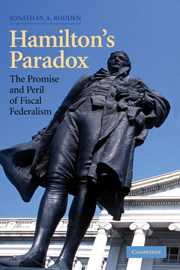Book contents
- Frontmatter
- Contents
- Preface
- Acknowledgments
- 1 INTRODUCTION AND OVERVIEW
- 2 PROMISE AND PERIL: INTELLECTUAL HISTORY
- 3 SOVEREIGNTY AND COMMITMENT
- 4 THE POWER OF THE PURSE: INTERGOVERNMENTAL GRANTS AND FISCAL DISCIPLINE
- 5 DISEASE OR CURE? POLITICAL PARTIES AND FISCAL DISCIPLINE
- 6 AN APPROACH TO COMPARATIVE CASE STUDIES
- 7 FISCAL FEDERALISM AND BAILOUTS IN POSTWAR GERMANY
- 8 THE CRISIS OF FISCAL FEDERALISM IN BRAZIL
- 9 THE CHALLENGE OF REFORM IN FEDERATIONS
- 10 THE ORIGINS OF SUBNATIONAL SOVEREIGNTY
- 11 CONCLUSIONS
- References
- Index
- Titles in the series
7 - FISCAL FEDERALISM AND BAILOUTS IN POSTWAR GERMANY
Published online by Cambridge University Press: 14 January 2010
- Frontmatter
- Contents
- Preface
- Acknowledgments
- 1 INTRODUCTION AND OVERVIEW
- 2 PROMISE AND PERIL: INTELLECTUAL HISTORY
- 3 SOVEREIGNTY AND COMMITMENT
- 4 THE POWER OF THE PURSE: INTERGOVERNMENTAL GRANTS AND FISCAL DISCIPLINE
- 5 DISEASE OR CURE? POLITICAL PARTIES AND FISCAL DISCIPLINE
- 6 AN APPROACH TO COMPARATIVE CASE STUDIES
- 7 FISCAL FEDERALISM AND BAILOUTS IN POSTWAR GERMANY
- 8 THE CRISIS OF FISCAL FEDERALISM IN BRAZIL
- 9 THE CHALLENGE OF REFORM IN FEDERATIONS
- 10 THE ORIGINS OF SUBNATIONAL SOVEREIGNTY
- 11 CONCLUSIONS
- References
- Index
- Titles in the series
Summary
The fundamental principle on which it [the German Confederation] rests, that the empire is a community of sovereigns, that the diet is a representation of sovereigns, and that the laws are addressed to sovereigns, renders the empire a nerveless body, incapable of regulating its own members, insecure against external dangers, and agitated with unceasing fermentations in its own bowels.
Alexander Hamilton and James Madison, The Federalist 19A closely knit institutional web limits the exercise of unilateral political initiatives by any one actor and encourages incremental policy change. In a word, it makes the West German state semisovereign.
Peter Katzenstein, Politics and Policy in West GermanyWhen making the case for a single, centralized sovereign to replace the system under the Articles of Confederation, Alexander Hamilton cited the loose eighteenth-century German confederation as an example of provincial sovereignty gone awry. He advocated a centralized system of finance and decision making that would relegate subnational governments primarily to the administration of policies conceived and funded by the center. Two hundred years later, the German federation is much closer to Hamilton's vision of centralized legislation and taxation than a “community of sovereigns.” Yet the German postwar constitution is nevertheless extremely federal in every respect outlined in Chapter 2. Above all, the Länder are very important players in the federal policy process, and the constitution provides them with a number of robust institutional safeguards.
- Type
- Chapter
- Information
- Hamilton's ParadoxThe Promise and Peril of Fiscal Federalism, pp. 153 - 187Publisher: Cambridge University PressPrint publication year: 2005

